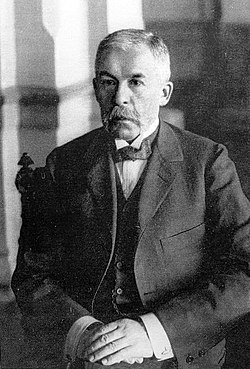Petr Nikolayevich Durnovo
| Pyotr Durnovo | |
|---|---|
 |
|
| Born | 1845 Moscow, Russian Empire |
| Died | 1915 Petrograd, Russian Empire |
| Nationality | Russian |
| Occupation | civil servant |
Pyotr Nikolayevich Durnovo (Russian: Пётр Николáевич Дурновó) (1845 in Moscow Governorate – 24 September [O.S. 11 September] 1915 in Petrograd) was an Imperial Russian lawyer and politician.
Pyotr Durnovo was born in the Moscow Governorate to the noble Durnovo family in 1845. He was a graduate of the Imperial Naval School and the Military/Naval Law Academy. He served in the Ministry of Justice reaching the position of Assistant Procurator of the Kiev Court of Appeals, until transferring to the Ministry of the Interior in 1881. Durnovo was appointed Director of Police in 1884 and remained in that position until 1893 when he was forced to resign due to a disagreement between himself and the Spanish Ambassador to Russia involving the misuse of police powers. He was appointed to the Imperial Russian Governing Senate in 1893 where he distinguished himself. In 1900, he was appointed Assistant Minister of the Interior in charge of Posts and Telegraph services at the request of Sipiagin. He remained in this position until 1905 when he was appointed Minister of the Interior, on Witte's recommendation. He retired from the position of Minister shortly after Witte's resignation from the Chairmanship of the Council of Ministers despite earlier differences between the two.
Durnovo was noted for his outspoken opposition to closer ties with the United Kingdom at the expense of relations with Germany. He believed that German and Russian interests were complimentary while a war between the two empires could only result in the destruction of the existing political orders of both. Durnovo set out his views, most of which were to be realized in the aftermath of World War I in a letter sent to Nicholas II in February 1914. Durnovo foresaw imminent war between Russia, France and Britain against Germany, Austro-Hungary, and Turkey. His memorandum accurately forecast that Russian defeat would be followed by the demoralization of the Imperial Army and the sweeping away of existing legislative institutions and intellectual opposition parties, in favor of "social revolution in its most extreme form". The document was found amongst the papers of Tsar Nicholas following the February Revolution.
...
Wikipedia
